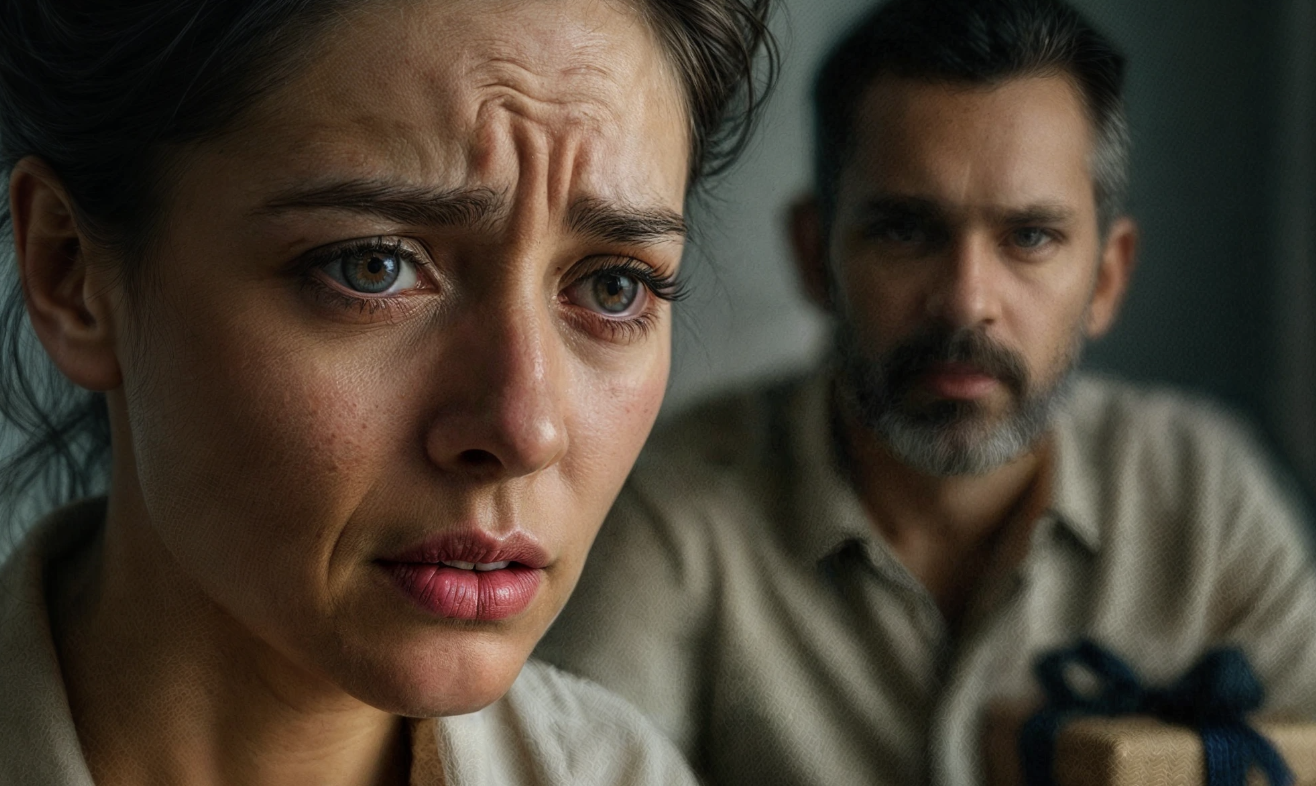We’re not going to the restaurant for your birthday. I’ve already canceled everything,” Marina said, neatly folding the wrapping paper into the box.
Her voice was even, almost flat, but there was something tired in it. A birthday should have been a reason to celebrate, but instead of anticipation she felt irritation mixed with a cold indifference.
There were boxes all over the kitchen—the remnants of the move and of recent purchases. From one of them Marina took out a massive cast-iron frying pan. She immediately felt the weight of the metal, the cold under her fingers, and that sense of “reliability” they always praise in ads. The pan was expensive, branded, with a ridged bottom “for perfect grill marks on steak.”
She set it on the stove next to the others—her husband’s gifts.
Last birthday—a set of pots.
For March 8, Women’s Day—a crepe pan.
For their anniversary—a sauté pan.
The kitchen shelf had turned into an exhibition of shiny but soulless cookware.
At that moment Ilya walked into the kitchen. His face shone with pride and satisfaction—like a man who’s sure he’s done something good.
“Well? How do you like it?” he asked, hugging his wife. “Told you, best brand. Now you’ve got the whole collection. And, by the way, I got it with a discount.”
Marina silently looked at the pan.
“Thank you,” she said quietly. “Very… practical.”
“Exactly!” Ilya brightened, missing both the sarcasm and the chill. “You cook incredibly well. I thought you’d enjoy using good cookware. Now you’ve got everything at hand.”
She didn’t answer. She ran her finger over the cold ridges on the bottom and felt an unpleasant sensation growing inside. Not anger—something closer to emptiness.
“So what you’re saying,” she spoke after a pause, “is that this is a present for me?”
“Of course! Who else?” he was genuinely surprised. “You yourself said it was inconvenient to fry meat in the old pan.”
Marina nodded.
“Yes, I did. And I also said that sometimes I’d just like to have dinner somewhere where I don’t have to stand at the stove.”
Ilya waved it off.
“Well, that’s different. Home-cooked food is better. And we can create atmosphere ourselves.”
His words sounded sincere, but there was no understanding in them. Only logic. Male logic—simple and straight as a line.
When he went back to the living room, Marina stayed by the stove, staring at the rows of pots and pans. They reflected the light like medals—not for victories, but for years of quiet, invisible submission to a role she had never chosen.
A Logical Response
The idea came suddenly, almost by accident. But the longer Marina thought about it, the more clearly she understood—this would be perfect.
If he saw her as a cook, then let him see himself in the mirror—as a handyman.
The next day she called the restaurant and calmly canceled the reservation she’d made a week earlier. The administrator was surprised, but Marina just smiled into the phone:
“Family circumstances. We decided to celebrate at home.”
That evening, when Ilya came back from work, she met him with a cup of tea and a smile in which fatigue and a faint mockery were mixed.
“We’re not going to the restaurant for your birthday,” she said casually. “I’ve already called them, canceled everything.”
Ilya froze with his keys in his hand.
“Wait, what do you mean? Why? We had plans!”
“I want to spend a quiet evening, just the two of us,” she answered softly. “You’ve given me so many kitchen appliances now that it would be a sin to eat anywhere else.”
He gave a confused little laugh.
“Well… that’s logical. Fine, whatever you say. Then maybe I’ll order delivery?”
“No need,” she shook her head. “I’ll cook everything myself.”
The next morning Marina got up early, baked a cake, and set the table. At ten o’clock the doorbell rang. A courier with a large box was standing on the doorstep.
“Please sign here. Delivery for Ilya Sergeyevich,” he said.
Ilya took the box with curiosity.
“Is this from you?”
“Open it,” Marina smiled, though her eyes remained cold.
He tore off the tape, lifted the lid—and froze. Inside lay a powerful professional hammer drill in a plastic case.
“A… hammer drill?” he repeated, clearly not understanding.
“Yes,” she replied calmly. “One of the most reliable models. Now you can drill through concrete walls. I added a core bit for concrete too—they say it’s indispensable.”
He stared at her, not sure whether to laugh or get angry.
“Is this supposed to be a joke?”
“Not at all,” Marina said evenly. “Aren’t practical gifts the highest form of care? You said so yourself.”
Silence hung in the air. Then he abruptly shut the case and set it by the table—the heavy box hit the leg with a loud thud.
“Very… original,” he muttered. “Thanks, I guess.”
Marina just shrugged.
“You’re welcome. The main thing is that it’s useful.”
They ate breakfast in silence. Only the sound of the spoon against the plate broke the quiet. Marina looked out the window and felt a strange sense of relief.
She had finally answered his logic with his own weapon.
Word for Word
During breakfast the air was as thick as the cold steam over cooling coffee. Marina said nothing. Ilya ate the cake she’d baked without once looking at her. Then he set his fork down and let out a heavy sigh.
“Marina,” he began, “I do appreciate your… concern. But a hammer drill? Why? I already have a drill. It’s just… weird.”
She looked at him calmly.
“And I already had three frying pans before you gave me a fourth. Yet you didn’t think that was weird.”
“That’s different!” he snapped. “I wanted you to be comfortable! For the kitchen to be like a chef’s.”
“And I wanted you to be productive,” she replied without raising her voice. “The only difference is that you decided what I needed, and I decided what you needed.”
Ilya pressed his lips together.
“You did this on purpose, didn’t you? To… prove something to me?”
“So you’d understand,” Marina nodded. “Understand what it’s like to get ‘practical’ gifts that don’t remind you of yourself, but of your role.”
He pushed back from the table so sharply that the chair banged against the tile.
“I don’t deserve this! I was just trying to do what’s best!”
“And I just wanted to be seen as more than the kitchen,” she said quietly.
He didn’t answer. He walked out of the kitchen, leaving the cake half-eaten.
The next evening Ilya came home late. He dropped his bag down loudly, shrugged off his jacket, and stopped by the kitchen door. Marina was sitting at the table, drinking tea and leafing through a magazine.
“Alright,” he said dryly. “I get your hint. My presents were… wrong. What do you want? Name it. Earrings? A dress? A vacation somewhere?”
Marina put down her cup and looked at him for a long moment.
“Right now you sound like you just want to close the issue,” she said calmly. “Not understand it—just resolve it so we never go back to it.”
“Well, what else am I supposed to do?” he threw back irritably. “I’m trying, and you’re nitpicking!”
“I’m not nitpicking, Ilya. I’m just tired of being part of your comfort.”
He turned away, clenched his fists, and walked out. The door shut softly.
After that they barely spoke. Only short phrases:
“Buy bread.”
“Wash the towels.”
“Where’s the iron?”
Their words became mechanical, their voices flat—like two coworkers forced to share the same space.
Marina more and more often cooked in the old, worn pan she had inherited from her mother. The new, “gift” one just sat there untouched. Sometimes Ilya would look at it, wanting to say something, but he couldn’t find the right words.
He understood: a wall had grown up between them. And he was the one who had built it.
Reflections in the Elders
A week later they went to visit Ilya’s parents—Larisa Viktorovna and Pavel Semyonovich. It was Sunday, the kettle hissed on the stove, and the house smelled of baking. Everything seemed as usual, yet there was a strange quiet at the table.
Larisa peered at them over her glasses.
“You two are awfully quiet today. Is everything alright?”
“We’re fine, Mom,” Ilya answered without looking up. “Just tired.”
Pavel chuckled.
“‘Just tired’—that’s what we used to call it when someone was sulking.”
Marina smiled slightly but replied gently:
“I guess we’re having… a creative crisis with gifts.”
“Oh really?” his mother perked up. “I was wondering why my son’s walking around so gloomy. What, you guessed wrong with a present?”
“On the contrary,” Ilya cut in with a hint of irony. “Now Marina’s decided to answer using my own logic.”
“Let me guess,” said Larisa, narrowing her eyes shrewdly. “He bought you something for the kitchen again, didn’t he?”
Marina nodded.
“And I got him a hammer drill.”
Pavel burst out laughing, almost spilling his tea.
“That’s the spirit! A man should feel the full depth of practicality!”
Larisa smirked, shaking her head.
“Nice way to answer. But you know, dear, it won’t fix it. Men think it’s all about the object itself. But really, it’s about what’s behind it.”
“Oh yeah,” Pavel snorted. “Remember when I gave you that juicer for your birthday? You didn’t talk to me for a month.”
“Of course I didn’t,” Larisa huffed. “I thought you saw me as some sort of kitchen appliance.”
“I just wanted to make your life easier!” he protested.
“Did I ask you to?” she replied coolly.
Marina and Ilya exchanged glances. Their eyes met—briefly, but long enough to understand: they weren’t the first to stumble over the same thing.
After dinner Larisa called Marina into the living room. It was quiet there, and it smelled of lavender.
“Listen,” her mother-in-law said softly. “I’ve been through this too. Men don’t do it out of malice. It’s just that their language of care is things. And ours is attention.”
“He keeps insisting I make a wish list,” Marina admitted. “So he’ll know what to buy.”
Larisa smirked.
“Then he hasn’t understood yet. When I put that juicer in a consignment shop and told him it had ‘broken,’ Pavel walked around pensive for a week. Then he finally asked: ‘What do you actually want?’ That’s when things started to change.”
Marina nodded. For the first time in a long while, she felt a little lighter inside.
The drive home passed in silence, but this time it wasn’t resentment—it was reflection. Each of them was lost in their own thoughts.
For the first time in a long time Ilya caught himself thinking that he had no idea what Marina wanted—not in terms of things, but in life.
Wish Map
That evening at home, Ilya went into the study they had planned to turn into a nursery. Usually the room was “Marina’s territory”—he rarely went in there except to grab a book or a tool.
A large world map hung on the wall. It was covered in multicolored pins, like a carpet where every mark meant something.
“What’s this?” Ilya asked, stepping closer.
Marina didn’t look up from her book.
“Places I want to go,” she said quietly. “Red ones are the most desired.”
He leaned in, examining the pins: the Norwegian fjords, Japanese hot springs, Peruvian mountains. He had never paid attention to these places, even though the map had been hanging there for years.
“I didn’t know,” he admitted at last, a bit sheepishly.
“You never asked,” she answered calmly. “And I never told you because I thought you wouldn’t understand anyway.”
Ilya braced his hands on the desk and stared at the map for a long time. Something clicked inside him—an understanding that her world was much wider than the kitchen and the cookware in it.
“I… I want to understand,” he said, almost in a whisper. “What matters to you.”
Marina smiled faintly. Her eyes softened. For the first time she felt that the wall between them was beginning to crumble.
“Alright,” she said. “Let’s start with what we can do without leaving the city. But someday we’ll go to those places.”
Ilya nodded. For the first time in a long time he felt that a gift didn’t have to be about pots, pans, or tools—but about understanding.
Turning Point
On their anniversary Ilya came home with a flat package. He looked excited and also a little shy.
“Here,” he said, handing the parcel to Marina. “I’m not sure this is what you wanted, but I tried.”
Marina unwrapped the paper. Inside was an old, worn map of South America, covered with a traveler’s markings and notes. In the mountains of Peru, a small red cross was drawn.
“That’s Machu Picchu,” Ilya explained. “You once said you wanted to go there. If you want, we can go.”
She took the map in her hands, traced the faded ink with her finger, and looked at the little cross. This wasn’t a gift to buy himself off. This was a gift from the heart—one that acknowledged her dream, not her role.
“Thank you,” she said quietly. “It’s the best gift I’ve ever gotten.”
“I was probably wrong before,” he admitted. “I used to see only what I wanted to see.”
Marina nodded, a small smile on her lips.
“Now you see.”
They hung the map on the living room wall. The red pins glowed against the soft colors of the wallpaper like beacons. Now it wasn’t just decoration, but a plan they were going to carry out together.
For the first time in a long time there were no walls between them—only maps and dreams they would explore side by side.
Ilya sat down next to her, and Marina laid her hand on his. There were no reproaches or accusations in that gesture—only understanding and a new beginning.
“So, we’re starting with Machu Picchu?” he smiled.
“We’ll start with Machu Picchu,” Marina replied. “And then we’ll see.”
And for the first time in a long time, they laughed together as equals, not as master and mistress of the house



